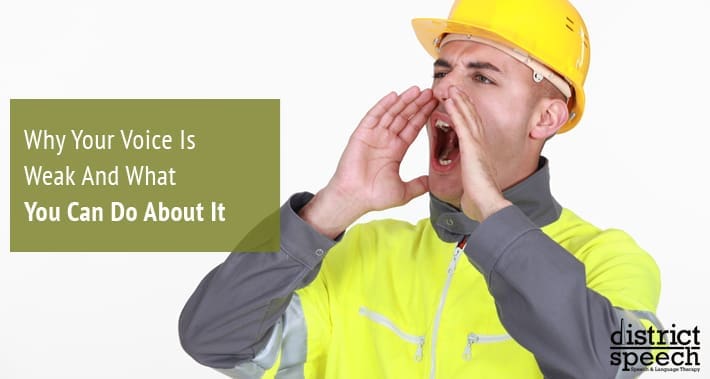
We rely on our voices to navigate our social worlds.
Our voices help us convey our wants and needs, share our thoughts and feelings, and communicate our deepest emotions.
Therefore, experiencing difficulties with our voices can lead to serious consequences on our daily lives.
If you’ve been diagnosed with a voice disorder, you may be experiencing vocal weakness and communication difficulties.
At District Speech, we can help.
Our expert speech therapists provide a variety of services that can help improve your vocal quality and vocal hygiene.
Let’s take a closer look at vocal weakness and how adult speech therapy can help.
What Is Vocal Weakness?
Asthenia, or more commonly known as vocal weakness, is a term used to describe physical weakness or fatigue during voice production.
If you are experiencing vocal weakness, your voice may be unusually low in volume or have a change in pitch.
Your voice may also sound “breathy”.
In some cases, vocal weakness can be connected with an underlying disorder.
What Causes Vocal Weakness?
Vocal weakness can be caused by several different voice disorders and conditions.
In order to effective produce voice, your vocal folds have to be able to periodically close.
Therefore, any disorder or conditions that interferes with your vocal folds’ ability to fully close may lead to vocal weakness.
Some disorders and conditions that may lead to vocal weakness include:
- Advanced age
- Throat cancer
- Vocal fold nodules and polyps
- Vocal cord tension and strain
- Hoarse voice (dysphonia)
- Parkinson’s disease
In other instances, vocal weakness may be caused by poor vocal hygiene.
Vocal hygiene refers to the good habits you do to take care of your vocal cords, such as resting your voice.
Therefore, prolonged overuse of your voice can also contribute to vocal weakness.
Those who work in certain professions that require them to shout, yell, or otherwise use their voices at high volumes tend to be more prone to poor vocal hygiene habits.
These include, but are not limited to:
- Bartenders and other nightclub workers
- Construction workers
- Airport ground personnel
- Miners
- Carpenters
- Extreme metal singers
- Auto racing pit staff
- Sanitary engineers
- Firefighters
Now that you’ve learned more about vocal weakness, let’s take a look at some speech therapy solutions to help manage your symptoms.
Using Vocal Function Exercises To Treat Vocal Weakness
Vocal function exercises help to strengthen your vocal cords as well as improve airflow, vocal cord vibration, and phonation.
Vocal function exercises have four stages: warm up, stretching, contracting, and power exercises.
Your speech therapist will teach you exercises that help train your voice and encourage correct sound production.
These exercises should be completed morning and evening in sets of two.

Using LSVT Big To Treat Vocal Weakness
Lee Silverman Voice Treatment, or LSVT for short, is particularly useful for individuals experiencing vocal weakness due to Parkinson’s disease.
LSVT is an intensive therapy that focuses on vocal loudness.
Your speech therapist will instruct you to make loud noises with as much vocal strength as you can manage.
While you do this, your speech therapist will monitor the loudness of your voice.
LSVT can help to improve your respiratory support, laryngeal muscle activity, and articulation.
Using Auditory Masking To Treat Vocal Weakness
Auditory masking can help with correct phonation.
Phonation refers to the process where your vocal fold produces specific sounds in language.
Your speech therapist will instruct you to talk or read aloud while simultaneously wearing noise cancelling headphones.
Your voice may be recorded and compared to your volume levels without headphones.
Other Speech Therapy Treatments For Weak Voice
There are many other treatment options that help with vocal weakness.
Your speech therapist will evaluate your voice to determine which treatment approach might be a good fit for you.
For example, resonant voice therapy uses conversational speech to encourage your voice to strengthen to maximize your vocal health and reduce risk of injury to your vocal cords.
Another example is biofeedback therapy, which focuses on monitoring internal bodily structures during speech in order to help alter voice production.
Make sure to speak with your speech therapist to help determine the best course of action for your specific strengths and limitations.
Book Your Appointment With District Speech Today
No matter the therapy approach taken, speech therapy can help improve your vocal quality, teach coping strategies to manage symptoms of vocal weakness, and encourage confidence in your vocal communication.
Have you been struggling with vocal weakness?
Do you want to learn more about the services we offer?
At District Speech, we want to help your voice reach its fullest potential.
Book an appointment with District Speech today to get started.
1300 I St NW, Suite 400 E,
Washington, DC 20005
- https://g.page/districtspeech
District Speech and Language Therapy specializes in speech therapy, physical therapy, and occupational therapy solutions, for both children and adults, in the Washington D.C and the Arlington Virginia areas.